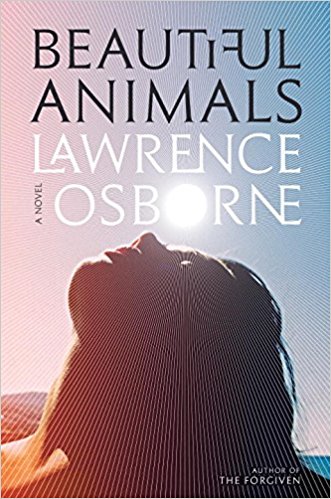Lawrence Osborne has occupied rarefied air in writing spheres since he made a name for himself in New York City over twenty-five years ago. Versatility became a strong suit. His star is shining brighter and rising higher of late since he abandoned the young man’s dying game of journalism for the equally risky life of a full-time nomadic novelist. After making it there he acquired or maintained an animal confidence to make it anywhere. He has lived or visited for stretches in Mexico, Istanbul, Macao, Italy, Greece, Cambodia, and Bangkok where he currently resides in a spacious condominium. The odds favor that there is no wind chime hanging above the balcony. His grown son lives in Japan.
The British born Osborne ticked all the right boxes to gain proper employment in London or New York with his Cambridge education and short stint at Harvard but opted instead for a pair of traveling shoes. As expats who choose to live in Bangkok go, Osborne brings more social capital to the scene than your typical foreigner living in Thailand. This is to be admired, ignored, envied or derided depending on your own psychological make-up, accomplishments, time management skills, and views on expat society and social standing.
The class conscious and taste conscious (good and bad) Brit was a veteran feature writer for The New York Times Magazine. He’s been published in Playboy, The Wall Street Journal, Salon, The New Yorker, and Men’s Vogue where he penned a monthly column on wine. His literary works are represented by Elyse Cheney and her agency. Ms Cheney made a credible list of the 50 Most Powerful Female Executives in New York City for 2015. Osborne’s non-fiction books include, The Poisoned Embrace, The Wet and the Dry, The Accidental Connoisseur, and Bangkok Days. Recent honors include being selected by the Raymond Chandler estate to write a Philip Marlowe crime novel. The work has been submitted but no publishing date has been announced. His critically acclaimed novel, The Forgiven is now a screenplay to be directed by John Michael McDonagh. In short, life is hard but not right now for Lawrence Osborne.

Beautiful Animals is the third Osborne novel that I have read – Ballad for a Small Player and Hunters in the Dark the latter set in Cambodia, are the other two. I found similar themes in each, along with decadently descriptive prose. The two main characters are young, fit and beautiful females. One slightly younger and more beautiful than the other. “Beautiful as panthers” according to Sam, short for Samantha, an American on summer holiday with her parents, the Haldane’s from New York. The primary setting is the Greek Island of Hydra and the surrounding areas. There Sam meets and falls under the spell of narcissistic Naomi, the dream seeking daughter of a rich British art collector, a hesitant raconteur named Jimmie Codrington. The inevitable island gossip includes rumors that Jimmie once palled around with Aristotle Onassis. Old Bohemians traced back to Leonard Cohen’s day still survive. Jimmie has owned an expensive Hydra home on a hill since the 1980s, filled with precious art. The acrimonious household includes Naomi’s not quite wicked step-mother of Greek origin, Phaine. Funny, her nickname, is snobbish and not particularly humorous when she’s not making a toast or sober. Funny doesn’t make the grade compared to the birth mother. They never do.
The novel is billed as a psychological study. It is. It could also be called a psychological simmer; it never gets up to a full boil, but that’s probably in the recipe Osborne planned to serve. The story is often dark, in places, but as the languid narrative voice states and this reader agrees, “The dark, however, was not a bad place to be.” Had the author heard a different calling he would have made a fine psychologist. A cruel eye makes for a better diagnostician, no doubt, than a confined therapist. People rarely change in Osborne’s novels and when they do it’s usually not for the better.
There is a resentful maid, of course, a Greek named Carissa who likes to have a laugh at the tourists’ expense. Loyal or not is anyone’s guess in the early stages. A rowboat oar wielding, pot selling local female makes recurring and memorable entrances and exits. Brief shadows of supernatural beings or guilt are also served up, ambiguously. Thankfully, no short-cuts were taken in the spiritual realm.
Pacing is Osborne’s strength yet there are possibly overly descriptive passages that include food and drink of the delicious and expensive variety. There are more feasts than assassins in this tale. Other readers may find the going slow. The story turns early on when Naomi and Sam discover a bearded Arab wearing only track suit bottoms and vagabond thongs. A scheme is devised to help the Muslim migrant for humanitarian reasons. Or not; it’s never clear. The secular Osborne must have had fun pairing godly and ungodly people together. Neither is particularly moral, even when overpaying for baked goods. That’s the desired message to consider.
Bad things happen to not so good people without a whole lot of action or dialogue going on at times.
The most likable character is a no longer dashing but still refined 70 year old sleuth, Mr. Rockhold. I enjoyed Rockhold for many reasons including his prudent choice of red wine. In Osborne’s fictional world the investigator wears a Panama hat (not a Fedora) and politely holds it to one side as he introduces himself to a panicking Naomi. The migrant, Faoud, turns out to be refined and educated as well and has a musical background. He later trades in his sandals for a pair of $600.00 shoes. A mistake, and the chase is on.
If there is a weakness to the storytelling in Beautiful Animals it is the believability of the plot points, big and small. Had the manipulative animal been American and the persuadable animal been from England I doubt even the author would have bought into the predicaments that ensue due to poor decision making made by intelligent and affluent people with much to lose. They both, after all, like the reluctant police officers pursuing a dangerous criminal in the tiny Italian settlement of Pian di Sco, cared about their lives, or should have. The fact that the nationalities are reversed does not make the scenarios any more credible. On the plus side before the plot points are made, misdirections and uncertainty are the norm.
There may be some worlds where a father can keep an audible secret concealed from his daughter for thirty years but none that I have been around. Osborne makes up for these lapses with his keen sense of observation and a breakdown of manipulation, apathy, meaninglessness, morality, religion, and greed. These elements coupled with the pacing make this a quick and sinister read.
Beautiful Animals should enjoy brisk sales on the East coast of the USA and with those who have summer homes in desirable locales. Hollywood will also likely take notice. I enjoyed and recommend Beautiful Animals by Lawrence Osborne. But, I am looking forward to his take on Philip Marlowe. That should go down a treat. Lawrence Osborne knows that the best way to get a handful of simmering eggs to hard boiled is to turn up the heat.
Beautiful Animals is available at all the usual outlets. Published by Hogarth Press.
- ISBN-10: 0553447378
- ISBN-13: 978-0553447378
To learn more Lawrence Osborne and his books go to: lawrenceosborne.net/


2 Responses to “Praise Be to Lawrence Osborne – Beautiful Animals, Book Review”
The review leaves me ambivalent. (I haven’t yet read anything by Osbourne.) Love your closing line.
Understood, Collin. Thanks for taking a moment to leave a comment.